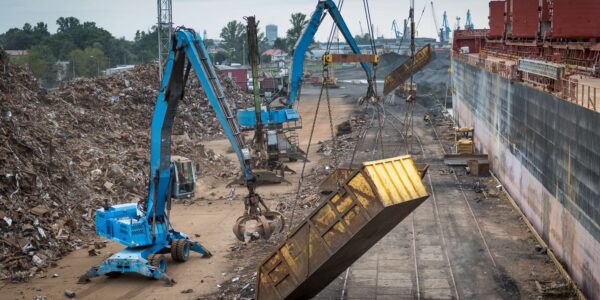The circular economy represents a transformative shift in how societies produce, consume, and manage resources. Moving beyond the traditional linear model of “take, make, dispose,” the circular economy seeks to eliminate waste and pollution, keep products and materials in use for as long as possible, and regenerate natural systems. It is an approach that prioritises sustainability and resource efficiency, aiming to decouple economic growth from the consumption of finite resources. In Australia, where environmental concerns are increasingly at the forefront of public discourse, companies like Resteel Recycling are playing a pivotal role in advancing circular economy principles through innovative metal recycling practices.
The Circular Economy: Principles and Benefits
The circular economy is underpinned by three fundamental principles: reduce, reuse, and recycle. These principles aim to transform traditional production and consumption processes into a regenerative system:
- Reduce: Minimising resource extraction and waste generation is central to the circular economy. By designing products with fewer materials and optimising manufacturing processes, businesses can significantly lower their environmental footprint.
- Reuse: Extending the lifecycle of products through repair, refurbishment, or repurposing delays their entry into waste streams. This principle promotes durability over disposability.
- Recycle: Recycling ensures that materials at the end of their lifecycle are processed and reintegrated into production systems. This reduces demand for virgin resources while conserving energy.
These interconnected principles create a closed-loop system that prioritises sustainability over depletion.
Economic Advantages
The circular economy offers compelling economic benefits. For businesses, efficient use of resources reduces operational costs while opening up new markets for recycled materials. Additionally, circular practices drive innovation in product design and manufacturing processes. Job creation is another significant advantage. The recycling industry requires specialised roles in collection, processing, and resource management, contributing to employment opportunities across Australia.
Environmental Impact
Circular economy strategies have proven effective in combating climate change. According to estimates, global implementation of circular practices could reduce emissions by 22.8 billion tonnes annually, which is equivalent to 39% of global emissions in 2019. In sectors like steel production, recycling can cut emissions by up to 74%, underscoring its potential for environmental preservation.
Resteel Recycling’s Role in Advancing Circularity
Resteel Recycling has emerged as a leader in promoting circular economy principles within Australia’s metal recycling industry. Their operations focus on collecting scrap metals from industrial, domestic, and commercial sources, including automotive wreckers, demolition companies, manufacturers, and tradespeople, and processing them into reusable materials. By recycling ferrous and non-ferrous metals such as steel, aluminium, copper, and zinc, Resteel reduces reliance on finite raw materials. Metals are among the few materials that can be recycled indefinitely without losing quality, making them ideal for circular practices.
Energy Savings
Metal recycling consumes significantly less energy compared to primary metal production. For instance, recycling aluminium saves up to 95% of the energy required for extraction from bauxite ore. This translates into lower greenhouse gas emissions, a critical factor in mitigating climate change. Resteel’s recycled metals contribute to sustainable construction practices by providing eco-friendly alternatives to virgin materials. Recycled steel is increasingly used in green building projects due to its durability and reduced environmental impact.
Resteel also plays a role in raising public awareness about sustainability. By encouraging individuals and businesses to recycle their scrap metal responsibly, they foster a culture of environmental stewardship within local communities.
Predictions for the Future
As Australia transitions towards a more sustainable economy, the role of metal recycling will become even more prominent. The following predictions outline how the industry and companies like Resteel Recycling may evolve in coming years.
Increased Adoption of Circular Practices
Circular economy principles will gain traction across industries as businesses recognise their economic and environmental benefits. Manufacturers will increasingly source recycled metals for products ranging from construction materials to consumer electronics.
Technological Advancements
Innovation will continue to drive efficiency in metal recycling processes. Advanced sorting technologies such as AI-powered systems will improve material recovery rates while reducing contamination. Additionally, electric arc furnaces (EAFs) are expected to become standard due to their lower energy consumption compared to traditional methods.
Australia is likely to see significant investments in recycling infrastructure as demand for recycled metals grows. Government initiatives aimed at reducing landfill waste will further accelerate this trend. Companies like Resteel Recycling will play a crucial role in scaling operations to meet increased demand. The synergy between renewable energy and metal recycling will strengthen as both sectors prioritise sustainability. Recycled metals will be vital for producing components used in wind turbines, solar panels, and electric vehicles—further embedding circularity into Australia’s clean energy transition.
Consumer-Driven Demand
As consumers become more environmentally conscious, businesses will face growing pressure to adopt sustainable practices. Recycled metals will be incorporated into a wider range of products, from fashion accessories to high-tech gadgets
Regulatory Evolution
Environmental regulations will become stricter over time as governments aim to achieve net-zero emissions targets. Extended producer responsibility (EPR) programmes may expand further, compelling manufacturers to incorporate recyclable materials into their designs.
Conclusion
The circular economy represents not just an opportunity but an imperative for addressing global sustainability challenges, and metal recycling lies at its heart. Companies like Resteel Recycling exemplify how innovative practices can transform waste into valuable resources while reducing environmental impact. By adhering to circular principles such as reduce, reuse, and recycle, Resteel contributes significantly to Australia’s transition towards a regenerative economy.
Looking ahead, advancements in technology and infrastructure will enable recyclers like Resteel to scale operations efficiently while meeting growing demand for sustainable materials across industries. Collaboration between stakeholders, manufacturers, policymakers, and consumers will be essential for driving systemic change.
In this era where environmental stewardship is paramount globally, the efforts of organisations like Resteel Recycling serve as both a model of progress today and a beacon illuminating pathways toward an even greener tomorrow! Through collective action rooted in circularity principles, we can ensure that our planet thrives sustainably for generations yet unborn!

